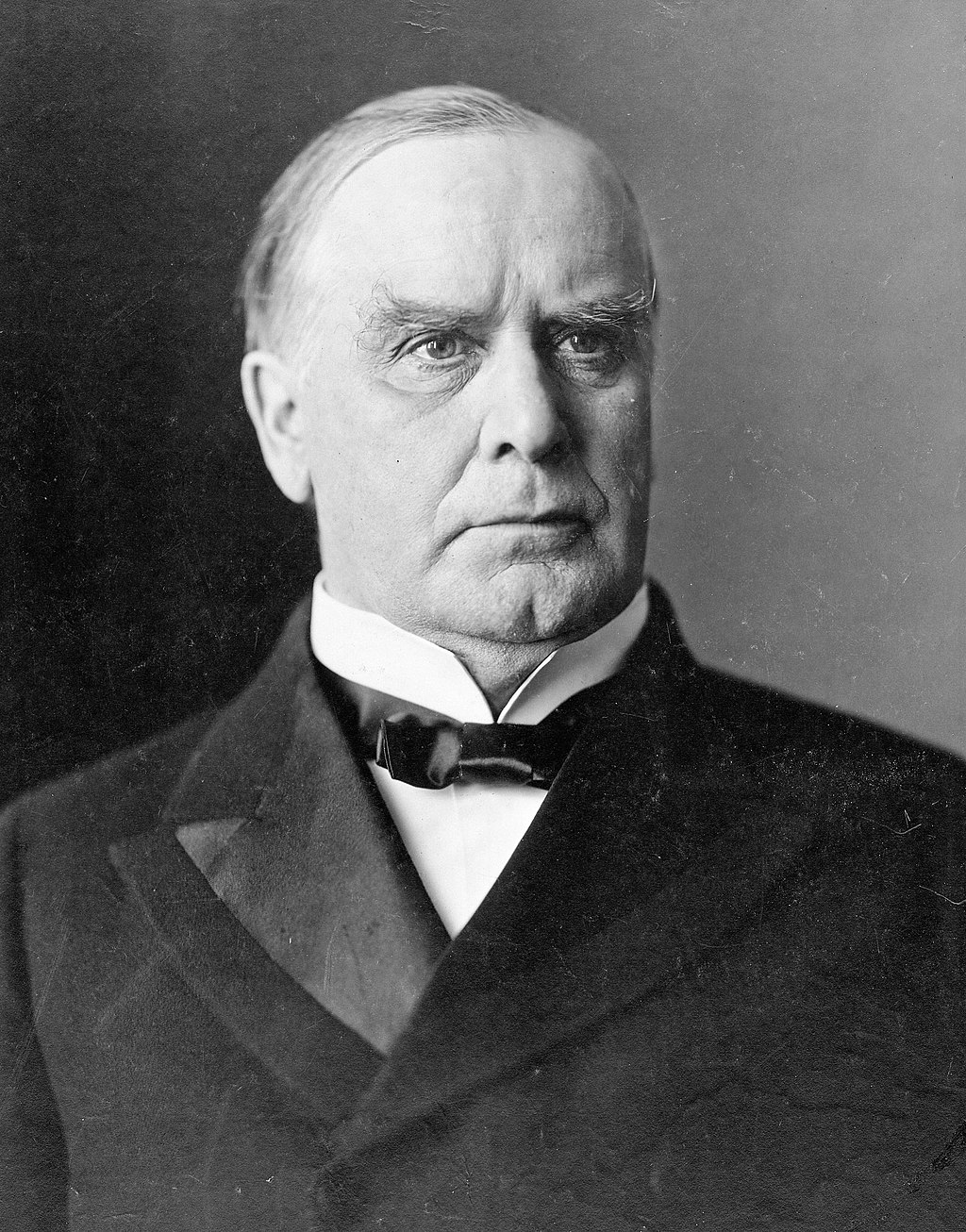William McKinley (1943-1901) was born in Ohio and attended Allegheny College and Mount Union College before serving in the Union Army during the Civil War where he achieved the rank of brevet major.
After spending about a year at the Albany Law School and studying with an attorney, McKinley began practicing law in Ohio. In time he was elected to represent Ohio in the U.S. House of Representatives where he served for two years as chair of the powerful Ways and Means Committee and was a strong advocate of protective tariffs.
McKinley served from 1892 to 1896 as governor of Ohio and, running on a pro-business platform of retaining the gold standard. He defeated Democrat William Jennings Bryan in the presidential election of 1896, which many political scientists consider to be a realigning election. McKinley defeated Bryan again in 1900 but was assassinated in 1901 and succeeded in office by Vice President Theodore Roosevelt.
McKinley's term known for acquisition of Puerto Rico, Guam, the Philippines
In 1898, during McKinley’s first term, the U.S. went to war with Spain (a war that is sometimes attributed to salacious stories in the press about Spanish mistreatment of colonists and the explosion of the warship Maine as it was docked in Cuba). As a result of victory in this conflict, the U.S. ended up gaining Puerto Rico, Guam and the Philippines as colonies; the later acquisition involved fighting an indigenous independence movement. The U.S. also pursued an “open door” policy with China and annexed Hawaii during his tenure.
McKinley’s first inaugural address was notable for the odd admonition that “We must be both ‘sure we are right’ and ‘make haste slowly.’” After extolling “equality of rights,” McKinley observed that “We may have failed in the discharge of our full duty as citizens of the great Republic, but it is consoling and encouraging to realize that free speech, a free press, free thought, free schools, the free and unmolested right of religious liberty and worship, and free and fair elections are dearer and more universally enjoyed today than ever before. These guaranties must be sacredly preserved and wisely strengthened.”
After excoriating lynchings and mob rule, McKinley noted that “The preservation of public order, the right of discussion, the integrity of courts, and the orderly administration of justice must continue forever [to be] the rock of safety upon which our Government securely rests.”
McKinley deals with religious rights in newly acquired colonies
McKinley was a devout Methodist who believed that the United States had a divine mission. Although the account has been questioned, one member of a Methodist General Missionary Committee who visited McKinley at the White House reported that, after praying for guidance, McKinley said that he had concluded that Americans had the responsibility “to educate the Filipinos, and uplift and civilize and Christianize them, and by God’s grace do the very best we could by them, as our fellow-men for whom Christ also died” (Smith 2015, 183). The statement was somewhat problematic since many Filipinos were Roman Catholics.
In his State of the Union Address of 1900, however, McKinley promised, in a pledge reflecting the two religion clauses of the First Amendment, that “no form of religion and no minister of religion shall be forced upon any community or upon any citizen of the islands; that, upon the other hand, no minister of religion shall be interfered with or molested in following his calling, and that the separation between State and Church shall be real, entire, and absolute.”
This pledge may have been somewhat undercut by the decision in Downes v. Bidwell, 182 U.S. 244 (1901), one of the so-called Insular Cases. That that case, the Supreme Court, in deciding that residents of unincorporated territories did not have the same rights as other Americans, observed that:
“If these possessions are inhabited by alien races, differing from us in religion, customs, laws, methods of taxation, and modes of thought, the administration of government and justice, according to Anglo-Saxon principles, may for a time be impossible, and the questions at once arises whether large concessions ought not to be made for a time, that ultimately our own theories may be carried out, and the blessings of a free government under the Constitution extended to them. We decline to hold that there is anything in the Constitution to forbid such action.”
McKinley cultivated press goodwill with regular meetings
As William Jennings Bryan barnstormed across the nation, McKinley conducted a “front-porch” campaign from his home in Canton, Ohio, where he gave brief speeches as numerous groups visited him there (Harpine 2000).
McKinley is credited with bringing about three significant changes with respect to the press, namely, “(1) increased presidential interest in meeting with correspondents personally and actively cultivate their good will; (2) anticipating and seeking to shape press coverage of the president’s view by making timely announcements in addition to replying to inquiries from the correspondents; and (3) establishing procedures in the executive mansion that for the first time made the presidency a predictable news ‘beat’ for correspondents” (Ponder 1994, 823-824). Shortly after his inauguration, McKinley attended a reception held by the Gridiron Club, and he wooed newspaper correspondents with friendliness and respect.
McKinley appoints McKenna to Supreme Court
McKinley is primarily known for the acquisition of foreign colonies, particularly in the Pacific. McKinley’s only appointment to the U.S. Supreme Court was Joseph McKenna, who upheld a number of convictions of individuals for criticizing U.S. participation in World War I.
McKinley’s assassination by an anarchist, who was the son of Polish immigrants who claimed to have been influenced by Emma Goldman, led to increased fears of immigrants that would later play into the Red Scare. The Free Speech League was established in 1902, largely to protect free expression regardless of its subject or viewpoint.
John Vile is a professor of political science and dean of the Honors College at Middle Tennessee State University. This article was published on Nov. 21, 2023.

